#Comédie sociale
Explore tagged Tumblr posts
Text
Pourquoi tu souris ?
Présentation du film Pourquoi tu souris ? de Christine Paillard et Chab Chenouga. Une comédie sociale touchante et drôle à la fois avec des acteurs formidables
Le film, intitulé Pourquoi tu souris, est une comédie sociale sur l’exclusion mais qui célèbre la joie de la solidarité et du partage. Wisi (Jean-Pascal Ziddi) débarque à Bordeaux, lui, le vigneron saisonnier, en galère complète. Dans l’association qu’il fréquente, il rencontre Marina, femme d’âge mûre, qui accepte de l’héberger. Pour attirer son attention, Wisi se fait passer pour un…

View On WordPress
#Amitié#Bénévole#Bric à brac de culture#Chronique#Chronique film#Chroniques ciné#ciné#Cinéma#Comédie#Comédie sociale#Drôle#Duo#emigration#Exil#Film#Films#Humanitaire#humour#Inadaptation#Maladie#Marginalité#migrants#Rire
0 notes
Text
deux types de profils psy qui valorisent l'adaptation sociale :
le caméléon
le faux-cul
comment distinguer l'un de l'autre ? en déterminant si celui qui juge ainsi est optimiste ou pessimiste sur le jeu comportemental du concerné…
0 notes
Photo
vous voyez j’avais reblog ça en hurlant « PHILINTE ET ALCESTE CORE PTN ». je sais maintenant que c’est un échange entre enjolras et grantaire. je ne retire pas mon précédent reblog parce que maintenant que j’y pense, dans un certain sens, philinte = enjolras alceste = grantaire

“You don’t believe in anything.”
“I believe in you.”
#something something être l’idéaliste et rappeler à ton pote qu’il est socialement inapte#tout en ayant quelque confiance et affection pour lui#something something être celui qui ne croit en rien à part l’amour qu’on peut porter à quelqu’un m��me quand on essaye de le changer#qui reste aux côtés de l’idéaliste malgré tout#is this thing on#les misérables#le misanthrope#comédie française
59K notes
·
View notes
Text
décidément lui et les interactions sociales ça fait 36 hein
0 notes
Text
Komi cherche ses mots T05 de Tomohito Oda
Komi cherche ses mots T05 de Tomohito Oda

View On WordPress
0 notes
Text

This might be a bit controversial but I’m just going to leave it here for discussion. Of all the amazing women from the Enlightenment / Frev, the Olympic Committee chose her (wherefore the proto-republican philosopher, Sophie de Grouchy or scientific pedagogue and philosopher, Emilie de Chatelet?! @enlitment). Or perhaps the dashing de Merincourt, industrious de Kéralio, ambitious Roland, activist Etta Palm d’Aelders, or (Romantic) intellectual, de Stael?
Then they bigged her up beyond parody, describing her as a femme politique (non! No known participation in any clubs or salons) and a campaigner for women’s rights (non again; here de Grouchy would be closer to the mark with her joint pamphlet with Condorcet, Cité des femmes etc.) De Gouges’ main output was plays rather than politics.
Yes, she wrote the witty rejoinder to the Declaration of the Rights of Man and the Citizen, but it was one of many pamphlets she self-published, and sandwiched between a dedication to the Queen and a complaint about being ripped off by a cabby driver.
she promoted the right to divorce (as did some men), rights for bastard children, a maternity hospital and novel proposals for raising public funds. other pamphlets were complaints about being ignored, suggestions for improving public morals (society women as culpable as ‘public’ women (ie prostitutes)), and attacks on the radicalism represented by Marat, the Jacobins and/or Robespierre.
As far as I know, she did not protest against the active/passive citizen distinction.
When the Amis des Noirs pressure group started to gain traction and social acceptance (Condorcet, Brissot and Lafayette were leading members), she rewrote her play on the Esclavage des Negres in 1788 to make it more political, with a preface urging recognition for the rights of ‘hommes Negres’, suggesting they would be happy to continue working the fields as free men. The main reason it wasn’t performed was not its subject matter but because she had previously tried to pull (social) rank on the Comédie-francaise to get her plays to the front of the queue, and had a massive bust-up with its director.
Don’t get me wrong, she was often a delightful and witty writer but also markedly eccentric and very much her own woman in a world of her own. Other women played far more prominent roles in trying to secure real change and better opportunities.
Probably the single greatest manifesto for improvements in women’s condition (but not the vote, or at least not yet), imho was Mary Wollstonecraft’s powerful appeal for equality in education (and to stop treating women like vain, simpering idiots defined by nature’s gifts - I’m looking at you JJ!). Talleyrand and the NA had proposed universal education only up to nine for girls.
PS she was also made a poster ‘girl’ for the Front Populaire with the slogan, ‘Gouges-toi’ (Bouge-toi), Which is actually pretty good!
PPS as for those headless Marie-Antoinettes in red, singing about Liberté along the Conciergerie, wow, just wow!
#Frev#french revolution#olympe de gouges#paris 2024#olympic ceremony#feminism#jean-paul marat#maximilien robespierre#Sophie de Grouchy#Emilie du Châtelet#mary wollstonecraft#education
22 notes
·
View notes
Text









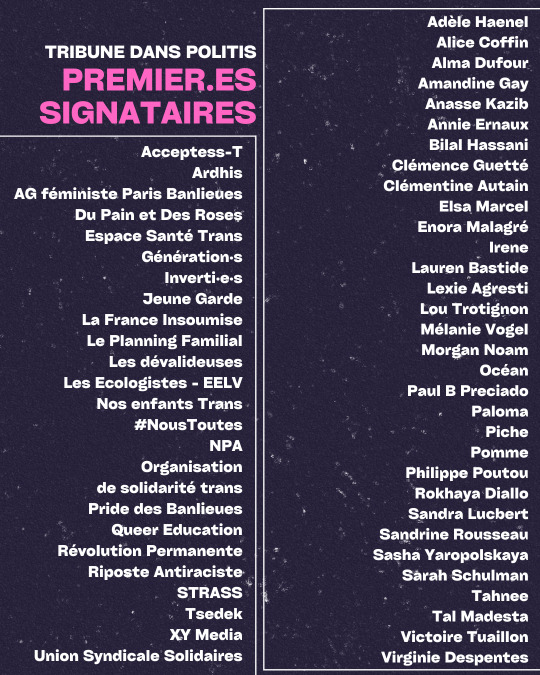
Le 5 Mai on fait front ensemble !
Bonjour à toustes ! 🌿🦊
Ce dimanche 5 Mai à lieu une mobilisation nationale de plus de 800 personnalités, organisations et associations pour se battre contre l'offensive réactionnaire et anti-trans de ces derniers mois.
Cette offensive, relayée par plusieurs grands médias (Figaro, le Point, Valeurs actuelles, le JDD, Marianne, Europe 1..etc) coïncident avec un certain livre complotiste sorti le 11 avril dernier et avec la proposition de loi des sénateurs du parti Les Républicains, qui veulent :
- Interdire la transition sociale et médicale des mineurs - Leur imposer des thérapies de conversion - Punir les médecins qui accompagnent les mineurs trans de 2 ans de prisons
Au delà des mineurs, le rapport de LR veut avoir la possibilité d'interdire toutes transitions des adultes jusqu’à 25 ans, une mesure qui est déjà adoptés dans certains états aux USA.
A côté de cela, ces mêmes partis laissent les enfants intersexes être mutilés à la naissance par soucis de "conformité"/"normalité". Ces attaques réactionnaires de la droite et de l'extrême droite à l'échelle internationale visent le droit à disposer de son corps, et donc directement les droits reproductifs comme l'IVG !
Féministes, LGBTIA+, antifascistes, nous devons faire front ensemble contre ces attaques des droits humains fondamentaux ! Rendez vous le 5 Mai IRL ou en ligne pour celleux qui comme moi ne peuvent pas aller manifester :
📌Paris : République, 14h 📌 Toulouse : Jean jaurès, 13h 📌 Marseille : Vieux port, 11h 📌 Strasbourg : 4 mai, pl. kléber, 17h 📌 Quimper : Place Saint Corentin, 18h 📌 Havre : Hôtel de ville, 15h 📌 Bordeaux : Hôtel de ville, 14h 📌 Besançon : Place Pasteur, 14h 📌 Niort : Place de la Brèche, 15h 📌 Bruxelles : 15h, en recherche du lieu 📌 Montpellier : place de Comédie, 15h 📌 Nantes : marche, Grue Jaunes sur l’ile, 14h 📌 Chambery : place de Génève, 14h 📌 Rennes : en préparation 📌 Lyon : en préparation 📌 Nancy : en préparation 📌 Lille : en préparation 📌 Lyon : en préparation 📌 Brest : place de la liberté, 17h 📌 Dijon : place Darcy, 16h 📌 Rochelle : quai du Carénage, 15h 📌 Lorient : Place Glotin, 15h 📌 Pau : préfecture de Pau, 16h 📌 Bayonne : place de la liberté, 12h 📌 Tours : place Jean Jaurès, 15h 📌 Poitiers : Place de Maréchal Leclerc
30 notes
·
View notes
Text

Depuis le 7 juillet dernier la France offre une très jolie séquence de lutte des classes. Dès 20 heures, à l’annonce de la « défaite » du RN à qui les sondages avaient promis 100 députés de plus, les 10 millions de Français qui leur avaient apporté leurs suffrages étaient instantanément vaporisés.
La magouille électorale qui avait vu LFI se précipiter pour réélire le flic Darmanin et la destructrice des retraites Élisabeth Borne avait fonctionné, avec au passage une remise en selle du PS.
Donc, à la niche les prolos qui à tort ou à raison font confiance au RN. Sur les plateaux de télé il n’était question que des futurs arrangements pour tenir les ouvriers et les employés à l’écart.
Par la suite, la petite bourgeoisie des métropoles réclamait son dû à Macron et du haut de ses 27 % prétendait à tous les pouvoirs. Fausses oppositions, accusations de violation de la constitution, insultes, le théâtre et le simulacre reprenaient tous leurs droits. Voilà maintenant qu’il faut « installer » l’Assemblée nationale. Et ça recommence, exit à nouveau les 10 millions d’électeurs, le premier groupe parlementaire avec ses 140 députés, les 34 % du premier parti de France, tout ce petit monde à la trappe. De façon très démocratique LFI, toujours soucieux de ne jamais respecter le moindre principe, veut à nouveau les invisibiliser et rappeler à tous ces horribles prolos représentés par le RN, qu’ils n’ont pas voix au chapitre.
« Arc républicain oblige », les députés qu’ils ont élus doivent s’asseoir dans l’hémicycle et fermer leur gueule. Foin des principes chez LFI, mais il est quand même savoureux de les entendre hurler au putsch anticonstitutionnel de Macron pour ne pas leur donner Matignon, en même temps que leur exigence de d’éviction des parlementaires RN. Piétinant allègrement l’article 10 du règlement de l’Assemblée nationale : « l’élection des vice-présidents, des questeurs et des secrétaires a lieu en s’efforçant de reproduire au sein du bureau la configuration politique de l’assemblée. » Pour les amis de Mélenchon, il faut violer les règles républicaines, sinon c’est nazisme, retraite aux flambeaux et construction de chambres à gaz.
Mais, il y a un problème.
Pour sauver Macron, LFI s’est prostituée et réclame à grands cris depuis, l’accès aux salons de la république pour le prix de sa passe. Mais ses petits copains de NFP complices de l’arnaque électorale, ne l’entendent pas de cette oreille. Ils ont parfaitement compris qu’il fallait mener le sauvetage de Macron, jusqu’au bout et font tout pour reconstituer le bloc central avec les macronistes. La proposition de Laurence Tubiana au poste de premier ministre, en est une illustration caricaturale. Voilà quelqu’un qui est financée par les officines américaines (dont Soros et Blackrock !) et a participé à toutes les magouilles antidémocratiques de Macron. Le psychopathe de l’Élysée ne serait guère contrarié.
Alors à l’Assemblée, les macronistes veulent profiter de l’occasion et de la perche tendue par les mélenchonistes avec leur proposition. En s’asseyant tout autant sur les règles républicaines, ils veulent exclure symétriquement le groupe LFI des postes institutionnels. Glapissements et cris d’orfraie chez les copains de Mélenchon.
« Invisibiliser les ouvriers et les employés, c’est normal, c’est même nous qui l’avons proposé, mais faire de même avec les petits-bourgeois des métropoles, c’est carrément un crime contre l’humanité ! »
Karl Marx, qu’on ne connaît pas chez LFI, disait : « l’'histoire ne fait rien à moitié et elle traverse beaucoup de phases quand elle veut conduire à sa dernière demeure une vieille forme sociale. La dernière phase d'une forme historique, c'est la comédie. » Ne serait-ce pas plutôt un cirque camarade ?
Source X regis de castelnau)
Comme prévu, on assiste à l'implosion du NFP, pour construire l'extrême centre, allant des LR à EELV, incluant le PS voire le PC autour de Ensemble. Reléguant le RN et LFI au statut de partis radicaux et "indignes de la République". Qui disait que Macron avait loupé sa manœuvre ?
4 notes
·
View notes
Text
I must admit, I'm starting to feel a bit weary of Hugo's boundless enthusiasm for the gamin. There was something about the melancholic convent chapters that seemed more inspiring to me.
Ok. But this chapter made me curious about Paris theatres – they seem to be quite democratic if street children could so easily frequent them. I found out that with the rise of the so-called secondary theatres in France after the revolutions of 1789 and 1830 they indeed became rather popular (the Comédie-Française was a notable exception). And I was surprised to learn that comedies were not the preferred genre among the people; instead, they had a fondness for melodramas, particularly those centred around social mobility.
But it seems that Hugo’s gamin had the opportunity to attend the Comédie-Française, given he witnessed performances featuring Mlle Mars. It’s confusing.
But I actually find some contrasting elements from which Hugo constructs an image of the gamin quite amusing: he “finds without seeking, knows what he is ignorant of, is a Spartan to the point of thieving, is mad to wisdom, is lyrical to filth”.
(And Mademoiselle Mars as represented in William Hazlitt, Notes of a Journey through France and Italy (London: Printed for Hunt and Clarke, 1826))

23 notes
·
View notes
Text

LE DERNIER JUIF - Une comédie sociale profonde et poétique, qui fera date.
D’abord par le sujet qui aborde avec tellement d’humour, de sensibilité, de drôlerie, de poésie, et d’humanité sur un sujet grave et complexe : l’intégration des communautés juives (sépharades), arabes, musulmanes, et noires, dans nos banlieues… Cette mixité victime de tant d'incompréhensions en interne, mais surtout de tant de préjugés de la part de ceux qui en ignorent tout.
A partir de cette thématique, la focale est mise sur les juifs de la loose, très peu représentés à l'écran. On avait déjà les Bling-Bling, les arnaqueurs, les victimes de la Shoa, les sionistes et les antisionistes, mais aux juifs à qui rien ne marche, personne n'avait encore imaginé leur écrire un scénario. Plus de voisins, plus de boucherie cacher, une maman malade, un fils au chômage, un immeuble en ruines, des affaires foireuses, une syna désertée, un bureau de la Alya désespéré, un père obscurantiste et absent, et pas même une chaise appropriée pour faire son deuil.
Et la juste mise en scène sans pathos de tout ceci, Noé Debré, grand scénariste, dont c’est le premier long métrage, la relève magistralement grâce au personnage de Bellisha. Le charisme de notre anti-héros tient dans la prouesse de jeu du comédien Michael Zindel, qui tient tout le film dans son corps, mélange de nonchalance et de vivacité d’esprit à s’adapter. Sans ce dernier, et le couple fils-mère incroyable qu’il réalise avec Agnès Jaoui, le film n'aurait jamais eu toute la saveur qu'il dégage.
Il faudrait aussi citer chacun des personnages secondaires qui ne sont pas en reste : Eva Huault, la délicieuse maitresse de Bellisha, Solal Bouloudnine, le cousin Asher, qui a la tchatche commerçante à saisir les bons coups, véritable contrepoint de l‘insouciante fausse-légèreté de Bellisha, et Youssouf Gueye, l’ami noir qui croit ne pas aimer les juifs.
Mais derrière ce cadre, se dessine l’autre sujet du film, plus profond : comment se séparer de sa mère quand on lui est attaché ? Cette (angoisse de) séparation court en filigrane à travers tout le film, s’intégrant à la séparation de l’Algérie, de la terre mère. Accepter de prendre sa valise, et d’explorer d’autres chemins, d’autres territoires.
Il n’y a pas de vie sans séparation.
La réussite à la fois discrète mais indiscutable du film tient encore aussi à deux choses : D’une part la voix off, un peu ampoulée, qui raconte le récit, et vous saisit dès les premières images du film. Comme si tout était écrit dès le départ du destin de Bellisha, pantin dans les mains du créateur, qui, l’air de rien, va savoir s’affranchir de ce destin, et d’autre part l’attitude clownesque du couple Zindael-Jaoui. C'est entre ces deux lignes que Michael Zindel, dont le personnage inouï, lunaire, toujours à côté de ses pompes, non sans une libido active, et laissant glisser sur lui les attaques et les coups de la vie, s’inscrit dans la droite lignée de Charlie Chaplin, Buster Keaton ou Jacques Tati.
Agnès Jaoui, nous étonne encore une fois de par se sensibilité. Puissante, burlesque, émouvante dans ses contradictions, ses angoisses, sa douleur; elle compose un incroyable duo avec Bellisha, dont on ne sait plus très bien qui est l’enfant et le parent…
NOTE 17/20 - Exceptionnel. Subtil, sensible, drôle, profond.
Touché par la grâce.
Les deux acteurs principaux, Agnes Jaoui au sommet de son art, et Michael Zindel génial. Entre La vie devant soi, ou Mangeclous, ce film est un chef d'œuvre d'humour, d'originalité et de légèreté.
Pour rendre drôles et légères les choses les plus graves.
3 notes
·
View notes
Text
Marguerite St. Just had first made her début in artistic Parisian circles, at the very moment when the greatest social upheaval the world has ever known was taking place within its very walls. Scarcely eighteen, lavishly gifted with beauty and talent, chaperoned only by a young and devoted brother, she had soon gathered round her, in her charming apartment in the Rue Richelieu, a coterie which was as brilliant as it was exclusive—exclusive, that is to say, only from one point of view: Marguerite St. Just was from principle and by conviction a republican—equality of birth was her motto—inequality of fortune was in her eyes a mere untoward accident, but the only inequality she admitted was that of talent. “Money and titles may be hereditary,” she would say, “but brains are not,” and thus her charming salon was reserved for originality and intellect, for brilliance and wit, for clever men and talented women, and the entrance into it was soon looked upon in the world of intellect—which even in those days and in those troublous times found its pivot in Paris—as the seal to an artistic career. Clever men, distinguished men, and even men of exalted station formed a perpetual and brilliant court round the fascinating young actress of the Comédie Française, and she glided through republican, revolutionary, bloodthirsty Paris like a shining comet with a trail behind her of all that was most distinguished, most interesting, in intellectual Europe.
The Scarlet Pimpernel by Baroness Orczy
#The Scarlet Pimpernel#Marguerite Blakeney#Marguerite St Just#Posting as a reminder to myself#Important bit of characterisation
6 notes
·
View notes
Text
Best English Poets of All Time- English Literature
Best English Poets of All Time- English Literature
The Best English Poets of All Time in english literature. people just know the poet death & birth and literary works.
William Shakespeare (1564 – 1616) English poet and playwright. Famous plays include Macbeth, Romeo and Juliet, Merchant of Venice and Hamlet. Shakespeare is widely considered the seminal writer of the English language.
Jonathan Swift (1667 – 1745) Anglo-Irish writer born in Dublin. Swift was a prominent satirist, essayist and author. Notable works include Gulliver’s Travels (1726), A Modest Proposal and A Tale of a Tub.
Samuel Johnson (1709 – 1784) Britishauthor best known for his compilation of the English dictionary. Although not the first attempt at a dictionary, it was widely considered to be the most comprehensive – setting the standard for later dictionaries.
Johann Wolfgang von Goethe (1749 – 1832) German poet, playwright, and author. Notable works of Goethe include: Faust, Wilhelm Meister’s Apprenticeship and Elective Affinities.
Jane Austen (1775 – 1817) English author who wrote romantic fiction combined with social realism. Her novels include: Sense and Sensibility (1811), Pride and Prejudice (1813) and Emma (1816).
Honore de Balzac (1799 – 1850) French novelist and short story writer. Balzac was an influential realist writer who created characters of moral ambiguity – often based on his own real life examples. His greatest work was the collection of short stories La Comédie humaine.
Alexandre Dumas (1802 – 1870) French author of historical dramas, including – The Count of Monte Cristo (1844), and The Three Musketeers (1844). Also prolific author of magazine articles, pamphlets and travel books.
Victor Hugo (1802 – 1885) French author and poet. Hugo’s novels include Les Misérables, (1862) and Notre-Dame de Paris (1831).
Charles Dickens (1812 – 1870) – English writer and social critic. His best-known works include novels such as Oliver Twist, David Copperfield and A Christmas Carol.
Charlotte Bronte (1816 – 1855) English novelist and poet, from Haworth. Her best known novel is ‘Jane Eyre’ (1847).
Henry David Thoreau (1817 – 1862) – American poet, writer and leading member of the Transcendentalist movement. Thoreau’s “Walden” (1854) was a unique account of living close to nature.
Emily Bronte (1818 – 1848) English novelist. Emily Bronte is best known for her novel Wuthering Heights (1847), and her poetry.
George Eliot (1819 – 1880) Pen name of Mary Ann Evans. Wrote novels, The Mill on the Floss (1860), Silas Marner (1861), Middlemarch (1871–72), and Daniel Deronda (1876)
Leo Tolstoy (1828 – 1910) Russian novelist and moral philosopher. Famous works include the epic novels – War and Peace (1869) and Anna Karenina (1877). Tolstoy also became an influential philosopher with his brand of Christian pacificism.
Fyodor Dostoevsky (1821-1881) Russian novelist, journalist and philosopher. Notable works include Notes from Underground, Crime and Punishment and The Idiot
Lewis Carroll (1832-1898) Oxford mathematician and author. Famous for Alice in Wonderland, Through the Looking Glass, and poems like The Snark.
Mark Twain (1835 – 1910) American writer and humorist, considered the ‘father of American literature’. Famous works include The Adventures of Tom Sawyer (1876) and Adventures of Huckleberry Finn (1885).
Thomas Hardy (1840-1928) English novelist and poet. Hardy was a Victorian realist who was influenced by Romanticism. He wrote about problems of Victorian society – in particular, declining rural life. Notable works include: Far from the Madding Crowd (1874), Tess of the d’Urbervilles (1891), andJude the Obscure (1895).
Oscar Wilde (1854 – 1900) – Irish writer and poet. Wilde wrote humorous, satirical plays, such as ‘The Importance of Being Earnest‘ and ‘The Picture of Dorian Grey’.
Kenneth Graham (1859 – 1932) Author of the Wind in the Willows (1908), a classic of children’s literature.
George Bernard Shaw (1856 – 1950) Irish playwright and wit. Famous works include: Pygmalion (1912), Man and Superman (1903) and Back to Methuselah (1921)
Sir Arthur Conan Doyle (1859 – 1930) British author of historical novels and plays. Most famous for his short stories about the detective – Sherlock Holmes, such as The Hound of the Baskervilles (1902) and Sign of Four (1890).
Beatrix Potter (1866 – 1943) English conservationist and author of imaginative children’s books, such as the Tales of Peter Rabbit (1902).
Marcel Proust (1871 – 1922) French author. Best known for epic novel l À la recherche du temps perdu (In Search of Lost Time) published in seven parts between 1913 and 1927.
William Somerset Maugham 1874 – 1965) British novelist and writer. One of the most popular authors of 1930s. Notable works included The Moon and Sixpence (1916), The Razor’s Edge (1944), and Of Human Bondage (1915)
P.G.Wodehouse (1881 – 1975) English comic writer. Best known for his humorous and satirical stories about the English upper classes, such as Jeeves and Wooster and Blandings Castle.
Virginia Woolf (1882 – 1941) English modernist writer, a member of the Bloomsbury group. Famous novels include Mrs Dalloway (1925), To the Lighthouse (1927) and Orlando (1928).
James Joyce (1882 – 1941) Irish writer from Dublin. Joyce was one of most influential modernist avant-garde writers of the Twentieth Century. His novel Ulysses (1922), was ground-breaking for its stream of consciousness style. Other works include Dubliners (1914) and Finnegans Wake (1939).
D H Lawrence (1885 – 1930) English poet, novelist and writer. Best known works include Sons and Lovers, The Rainbow, Women in Love and Lady Chatterley’s Lover (1928) – which was banned for many years.
Agatha Christie (1890 – 1976) British fictional crime writer. Many of her books focused on series featuring her detectives ‘Poirot’ and Mrs Marple.
J.R.R. Tolkien (1892 – 1973) – Professor of Anglo-Saxon and English at Oxford University. Tolkien wrote the best-selling mythical trilogy The Lord of the Rings. Other works include, The Hobbit and The Silmarillion, and a translation of Beowulf.
Vera Brittain (1893 – 1970) British writer best known for her autobiography – Testament of Youth (1933) – sharing her traumatic experiences of the First World War.
F. Scott Fitzgerald (1896 – 1940) American author. Iconic writer of the ‘jazz age’. Notable works include The Great Gatsby (1925), and Tender Is the Night (1934) – cautionary tales about the ‘Jazz decade’ and the American Dream based on pleasure and materialism.
Enid Blyton (1897 – 1968) British children’s writer, known for her series of children’s books – The Famous Five and The Secret Seven. Blyton wrote an estimated 800 books over 40 years.
C.S. Lewis (1898 – 1963) Irish / English author and professor at Oxford University. Lewis is best known for The Chronicles of Narnia, a children’s fantasy series. Also well known as a Christian apologist.
Ernest Hemingway (1899 – 1961) Ground breaking modernist American writer. Famous works included For Whom The Bell Tolls (1940) and A Farewell to Arms (1929).
Vladimir Nabokov (1899 – 1977) Russian author of Lolita (1955) and Pale Fire (1962)
Barbara Cartland (1901 – 2000) One of most prolific and best selling authors of the romantic fiction genre. Some suggest she has sold over 2 billion copies worldwide.
John Steinbeck (1902 – 1968) American writer who captured the social change experienced in the US around the time of the Great Depression. Famous works include – Of Mice and Men (1937), The Grapes of Wrath (1939) and East of Eden (1952).
George Orwell (1903 – 1950) – English author. Famous works include Animal Farm, and 1984. – Both stark warnings about the dangers of totalitarian states, Orwell was also a democratic socialist who fought in the Spanish Civil War, documenting his experiences in “Homage to Catalonia” (1938).
Samuel Beckett (1906-1989) Irish avant garde, modernist writer. Beckett wrote minimalist and thought provoking plays, such as ‘Waiting for Godot’ (1953) and ‘Endgame‘ (1957). He was awarded the Nobel Prize in Literature in 1969.
Albert Camus (1913 – 1960) – French author, journalist, and philosopher. Associated with existentialism and absurdism. Famous works included The Myth of Sisyphus, The Stranger and The Plague.
Roald Dahl (1916 – 1990) English author, best known for his children’s books, such as Willy Wonka and the Chocolate Factory, James and The Giant Peach and The BFG.
Aleksandr Solzhenitsyn (1918 – 2008) Russian author, historian and political critic. Solzhenitsyn was awarded the Nobel Prize for Literature in 1970 for his work in exposing the nature of Soviet totalitarianism. e.g, The Gulag Archipelago (1965-67).
J.D. Salinger (1919 – 2010) American author. Most influential novel The Catcher in the Rye (1951). Wrote many short stories for New Yorker magazine, such as “A Perfect Day for Bananafish”
Joseph Heller (1923 – 1999) American novelist, who wrote satirical and black comedy. His most famous work is ‘Catch 22’ (1961) – a satire on the futility of war.
Gabriel Garcia Marquez (1927 – 2014) Colombian author. Wrote: One Hundred Years of Solitude (1967), The Autumn of the Patriarch (1975) and Love in the Time of Cholera (1985). Nobel Prize in Literature (1982).
Anne Frank (1929 – 1945) Dutch-Jewish diarist. Known for her diary ‘Anne Frank‘ Published posthumously by her father – recalling her life hiding from Gestapo in occupied Holland.
Salman Rushdie (1947 – ) Anglo-Indian author. His works combine elements of magic realism, satire and historical fiction – often based on Indian sub-continent. Notable works include Midnight’s Children (1981), Shame (1983) and Satanic Verses (1988).
Stephen King (1947 – ) American author of contemporary horror, supernatural fiction, suspense, science fiction, and fantasy. One of the best selling authors of modern times.
George R.R Martin (1948 – ) American author of epic fantasy series – A Song of Ice and Fire, – his international best-selling series of fantasy, adapted for the screen as a Game of Thrones.
Douglas Adams (1952 – 2001) British writer of humorous and absure science fiction. Adams wrote a best selling trilogy (of five books) The Hitchhiker’s Guide to the Galaxy – which began as a BBC play.
J.K.Rowling (1965 – ) British author of the Harry Potter Series – which has become the best selling book series of all time. Her first book was Harry Potter and thePhilosopher’s Stone (1997). Rowling has also published adult fiction, such as The Casual Vacancy (2012) and The Cuckoo’s Calling (2013)
Khaled Hosseini (1965 – ) Afghan born American writer. Notable works include: The Kite Runner (2003) A Thousand Splendid Suns (2007) And the Mountains Echoed (2013)
Homer (c. 8th Century B.C. ) Considered the greatest of the ancient Greek poets. Homer was the author of the two epic poems, The Iliad and The Odyssey.
Sappho ( c 570 BC) One of the first published female writers. Much of her poetry has been lost but her immense reputation has remained. Plato referred to Sappho as one of the great ten poets.
Virgil (70 BC – 19 BC) Roman poet. Wrote three epics Eclogues (or Bucolics), the Georgics, and the Aeneid.
Dante Alighieri (1265–1321) Italian poet of the Middle Ages. His Divine Comedy, is one of most influential European works of literature. Dante is also called the “Father of the Italian language”.
Geoffrey Chaucer (1343 – 1400) Considered the Father of English Literature. Best known for Canterbury Tales (1475).
John Milton (1608 – 1674) English poet. Best known for his epic poem Paradise Lost (1667), written in blank verse – telling the Biblical story of man’s fall. Also wrote Areopagitica (1644) in defence of free speech.
William Blake (1757 –1827) English mystic and romantic poet, wrote Songs of Innocence and Songs of Experience. Also hand-painted many of his works.
William Wordsworth (1770 – 1850) English romantic poet from Lake District, many poems related to natures, such as his Lyrical Ballads.
Samuel Taylor Coleridge (1772 – 1834) English romantic poet. Author of The Rime of the Ancient Mariner and Kublai Khan.
Percy Bysshe Shelley (1792 – 1822) English romantic poet. Famous works include Queen Mab and Prometheus Unbound
John Keats (1795 – 1821) English Romantic Poet, best known for his Odes, such as Ode to a Nightingale, Endymion.
Ralph Waldo Emerson (1803 – 1882) American Transcendentalist poet and writer.
Alfred Tennyson (1809 – 1892) Popular Victorian poet, wrote Charge of the Light Brigade, Ulysses, and In Memoriam A.H.H.
Walt Whitman (1819 – 1892) American poet. Wrote Leaves of Grass, a ground breaking new style of poetry.
Emily Dickinson (1830 – 1886) American female poet. Led secluded lifestyle, and left legacy of many short vivid poems, often on themes of death and immortality.
Rabindranath Tagore (1861 – 1941) Indian poet. Awarded Nobel Prize for Literature for his work – Gitanjali.
Robert Frost (1874 – 1963) – Influential American poet, one of most highly regarded of the Twentieth Century. Most famous work ‘The Road Not Taken’ (1916)
Maya Angelou (1928 – 2014 ) – Modern American poet and writer. Source: Internet
3 notes
·
View notes
Text
Komi cherche ses mots T04 de Tomohito Oda
☃️J'ai lu Komi cherche ses mots T4 de Tomohito Oda - @pikaedition 🎄Je vous recommande chaudement ce shônen manga qui nous offre une très belle comédie drôle avec des thématiques sérieuses, mais toujours amenées avec l’humour qu’il faut 😊
Mon avis : On suit Komi avec une certaine délectation de la fin de ses vacances d’été à la reprise des cours et c’est toujours aussi passionnant. Alors certes, notre chère héroïne ne parle pas, mais ses expressions même assez monofaciales sont toujours très mignonnes et les situations qui l’entourent ou qu’elle entraine sont souvent très drôles. C’est surtout grâce à son entourage et ses ami. e.…

View On WordPress
0 notes
Text
The 2022 Big Book Review
Books read in 2022
Absolutely non-exhaustive. I dropped Goodreads and can’t keep track of anything I don’t write down. Also not counting the children’s books and other quite short stuff I read in 5 minutes so I can tell customers what it’s about.
All in all : it’s a CLASSIC year lads. And I’ll be screaming about Marguerite Yourcenar to everyone forever.
Total (minus comics): 60 books
Total (including everything): 168 books
I organized them loosely, but it won’t be very consistent. Tried to add some comment but this won’t be a literary review
Classics
Mémoires d’Hadrien – So good omg. One of the books ever. Words fail me to say how much this book is amazing. Made me visit the Villa Adriana when I went to Rome. Indirectly responsible for a tendinitis in my left foot. Madeline Miller WISHES she were Yourcenar.
Miss Pettigrew lives for a day - A cute one! Recommended by my sister
La guerre de Troie n’aura pas lieu - found in an old edition in a tiny free library. Very good & depressing
La vie de Monsieur de Molière, Boulgakov - If I had a nickel each time I read a book by a beloved author written by another beloved author, I’ll have two nickels.
Balzac, le roman de sa vie, Zweig – See above
Mille et un fantômes, Dumas - a Russian-doll-type-set of stories, but I have no recollection of them
Lorenzaccio - my sister recommended it to me in 2010. Finally got around to it.
Little House in the Big Woods - Cottagecore before it was cool. Also devoid of the unfortunate racism of the sequel
Le Vicomte de Bragelonne 1 & 2 - I’ll finish it next year for sure
Balzac et la petite tailleuse chinoise - loved the book, hated the ending
Pauline, Dumas - it was okay, I guess
La fin de Satan, Hugo - “Les soleils étaient loin, mais ils brillaient encore”. Hugo always goes HARD
Balzac :
Here’s an extract from a June entry in my diary : « because of a tumblr post, I started reading Le père Goriot, and it’s quite good, which I find irritating ». And now look here we are.
Le père Goriot - So Good. So good I keep jokingly (?) recommending it to customers when they don’t know what book to buy
Le Code des Gens honnêtes - a fun read. Serves as documentation for 19th century life, too
Illusions Perdues - It’s like watching a car crash for 800 pages. In other words, excellent. Also did not expect the ending.
Splendeurs et misères des courtisanes - Come for the story, stay for the harsh commentary on capitalists that Marx wishes he wrote. Horrible, and a masterpiece.
Ferragus - only read it because of the “there’s a secret society in La Comédie Humaine” premice.
La Duchesse de Langeais - funnier once you learn exactly why Balzac wrote it
La Fille aux yeux d’or - Marsay is a dick and I love it
Le Colonel Chabert - SO. GOOD.
La peau de chagrin - This year’s mandatory reading for highschoolers. I pity them.
La Rabouilleuse - Ft the most punchable asshole you’ll ever read in your life
La maison du chat qui pelote – which does not mean, as I initially thought « the house of the cat who plays with a ball of yarn »
Mémoires de deux jeunes mariées - Both very good and quite sad, I couldn’t say why
Le Curé de Tours - Beware the Old Maids, they’ll ruin your life if you don’t treat them well. Pettiness is not a crime, except when it is.
Pathologie de la vie sociale - no recollection of it
History
Les bas-fonds, naissance d’un imaginaire - Very good! Required reading if you love 19th century (and early 20th) literature
La vie quotidienne des religieux au Moyen-âge - Read for documentation purposes
La vie quotidienne des templiers - ditto
La vie quotidienne sous le Directoire - ditto. Quite interesting!
La vie quotidienne des français sous Napoléon, Tulard - I had to hunt it down, but it was worth it. Tulard knows his stuff.
La vie quotidienne à Florence au temps de Dante - Read in Florence, of course.
La vie quotidienne en Italie au temps de Machiavel - To carry on after the previous one.
Yeah, I own quite a lot of these books.
Les jours sans : l’alimentation en temps de guerre - Read it before, but worth it. It’s always good to see history from the side of everyday life.
Pour vous mesdames ! La mode en temps de guerre - Disappointing.
Les Douze heures noires, la nuit à Paris au XIXè siècle - SO GOOD. But I said this before.
Le monde du crime sous Napoléon - Jean Tulard again. Still knows his stuff, but it’s more trivia than a real historical study
Manga
I have to read quite a lot of them for my work. It’s hard, I know. I read the whole series, unless specified
Thermae Romae - still a favourite
Vinland Saga - everyone should read Vinland Saga. Everyone.
Angel Sanctuary 1-20 - Sadly does not hold up today.
Toilet-Bound Hanako-kun - One of my favourite new series. I laud it (and sell it) every chance I can.
Look Back - are you an artist? Read this.
Nonnonbâ, Mizuki Shigeru - a very sweet story. But then I love Mizuki’s work.
Berserk 1-4 - good art, but I’m not sold on the story. I’ll try again, I think.
Spy x Family - For once, a series that is both popular and good enough for me to sell to parents who don’t know anything about manga
The Apothicary’s diaries, 1-5 - Not bad, maybe even good, but I don’t get the hype around it
Atelier of Witch Hat, 10 - read this series. That is all.
Kitchen of Witch Hat - Exactly what I want: short, slice of life stories in a fantasy world, centered around food.
Heaven’s Design team 1 - Not bad.
Beastars 21&22 - Good ending to a great series
DanDaDan - the other of my favourite new series. Highly recommended if you’re not allergic to absurd stuff.
Chouchin X 1&2 - Can’t get behind this, sorry. And yet I loved Tokyo Ghoul.
Comics
Not much to say about this section, I’m afraid.
Three Joker
The Joker : 80 years
I, Joker (yeah, it was a Joker binge)
Batman : Year one
Beasts of Burden
The Ex-People - a nice indie comic ft an immortal horse (among others)
The entire Calvin & Hobbes series - as often
Franco-belgian comics
Les cahiers d’Esther 3 – 7
Journal d’un ingénu 3 - 4
Le Projet Jules Verne
E.C. Jacobs, le rêveur d’apocalypse
La Marque jaune - directly linked to the one above.
Jours de sable - an indie comic about the Dustbowl. Both excellent and depressing
L’arabe du futur 6 - READ IT
Mystery & Thrillers
Messieurs les hommes, S. Antonio - San Antonio is (was?) a big name in the roman de gare genre. The language used is worth bearing the sexism of the MC (in par for the course for a novel written in the 50s, but still)
La Daronne - a very fun read
The Cuckoo’s Call
Career of Evil
Lethal White
Troubled Blood - All of these are good, but I especially loved this one + Career of Evil (bc BÖC)
The Shawshanks Redemption
Du plomb dans la tête – Absolutely bad. Doesn’t help that it was supposed to be a revenge story, and instead I got a badly written pseudo-shocking thriller. Blah.
Which strenghtens my theory that women just write better thrillers than men.
Contemporary, fantasy & YA
Game Changer, N. Shusterman
A Deathly Education – Why don’t I see anything about this series anywhere ? It’s so good.
The Invisible Life of Addie Larue, V. Schwab - aka I think one of the only YA writers worth reading past 25
Legends and Lattes – The best coffeshop slice of life fantasy I had the pleasure of reading. The only one in existence, which is a crying shame
Gideon the Ninth - no need to say anything about it. Tumblr knows it’s a masterpiece
Âge Tendre, C. Beauvais - A sweet read, and cleverly written, too
Les petites reines, C. Beauvais
Vampyria 3, V. Dixen – See my comment about Deathly Education. We’ve got a dystopian YA series where Louis XIV is a vampire and no one talks about this ?
Hogfather
Equal Rites
Mort
The Truth - Yeah, I re-read a bit of Discworld. Whenever I find myself in a reading slump, Pratchett’s always got my back.
Others :
Vers la sobriété heureuse, P. Rabbi
L’humanité en péril 2, Vargas
Tried reading more books about ecology and sobriey but it’s quite depressing.
#books#year in reading#2022 reads#ramblings#next year's gonna be a classic one too I think#still so many Zola Dumas and Hugo books to read
2 notes
·
View notes
Text
Récompenses de la Faucheuse: Semaine 6
🎵 Rise - John Dreamer
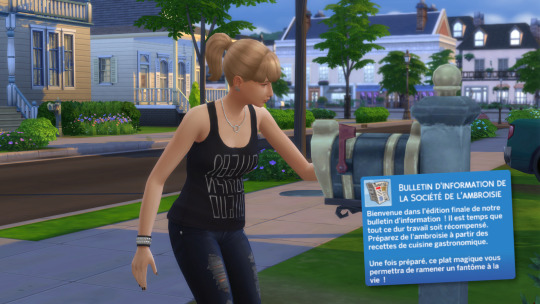
Un nouveau bulletin d'information de la Société de l'ambroisie est arrivé. Le dernier! Bien que l'aventure ait pu mettre du piquant dans la vie d'Estelle, il est temps de boucler les quêtes pour reprendre un mode de vie plus normal.
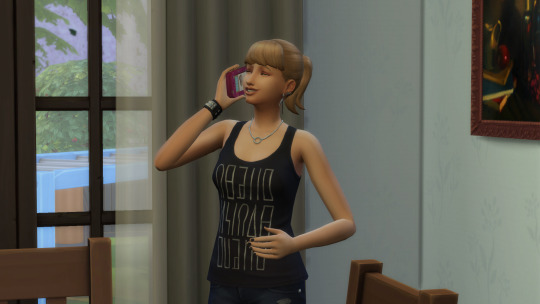
Un des objectifs cette semaine: organiser un événement social. Estelle prend donc le téléphone pour convier ses amis à un dîner pour souligner la fin de l'événement.

Derek profite du dîner pour préparer un repas de son cru, ce qui le fait passer au niveau 10 en Cuisine. Bienvenue dans le club! Il n'est jamais trop tard!

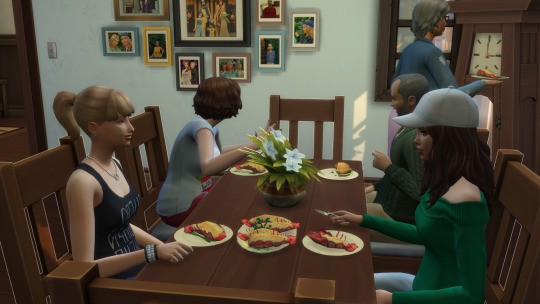


Le dîner d'Estelle va bon train. Tous les invités ont du plaisir et se régalent.

L'événement social se termine. Les invités, réjouis de leur soirée, rentrent chacun chez eux. Le dîner est un succès et Estelle peut être fière d'avoir brillamment rempli sa mission.

Le lendemain, Anaïs atteint le niveau ultime de la Comédie. La complétion de cette compétence lui permet également de terminer son aspiration (As des blagues) et d'obtenir un nouveau trait, Hilarante.

Avec tous les points obtenus pendant la quête de la Faucheuse, Estelle a pu compléter la collection des lapins! Elle reçoit même une plaque en l'honneur de cet exploit.

Il ne manque plus qu'une tâche à faire pour clore officiellement l'événement de la Faucheuse: préparer l'ambroisie. Mais d'abord, Estelle doit atteindre le niveau 10 en Cuisine et en Cuisine gastronomique. Elle reste debout très tard pour le faire, et elle réussit, malgré la fatigue.

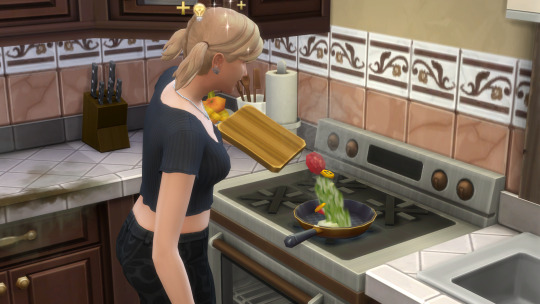

Estelle boit une potion pour retrouver de l'énergie. Maintenant qu'elle a tout ce qu'il faut pour préparer l'ambroisie, on ne va pas s'arrêter si près du but! Elle fait une nuit blanche afin de préparer l'ambroisie!

Et voilà! L'événement est terminé.

Le lendemain, Estelle revient de l'école avec un A. Wow! Elle n'avait jamais eu de facilité ou d'ambition pour avoir de bonnes notes, mais cet épisode avec la Faucheuse a été un catalyseur pour son estime. Avec persévérance, elle s'est prouvée qu'elle était capable d'accomplir de grands objectifs.👏
Cela termine les quêtes pour la semaine 6 ainsi que l'événement!
0 notes
Text
Que Tu Caches et qu'On Condamne
Donc je te mets la suite des tags en texte :
1 Elle avait été choisie par Dieu pour être ma femme (et les gens qui pensent que je suis taré : je vais pas me taire pour vous)
2 On était inséparables dès la 1e fois qu'on s'est parlés mais elle était avec ce soldat de Tsahal. Je sais plus quand on a commencé à se coller l'un à l'autre, en seconde je crois, et donc ça a duré jusqu'à une diffamation de Mathilde par jalousie, soit je sais pas combien de fois mais vu qu'on était tout le temps ensemble en cours...
3 Y avait cette mode atroce des gens qui s'estimaient supérieurs socialement à moi par critère apparemment de marques de fringues, parce que mes parents refusaient de nous laisser rentrer dans ce jeu et nous offraient autant de choses qu'on peut rêver, mais pas les "Chevignon", "Compagnie de Californie", "Timberland", etc.
Et malgré la gentillesse et l'intelligence de certains de mes meilleurs amis, tu peux avoir "la veste en jean Levi's qui va bien" et "le 501 qui va bien", si t'as des "imitations Timberland" tu vas être ostracisé dès qu'ils sont en groupe de bourgeois. Je donne pas les noms mais ça allait tellement loin que je me suis retrouvé 100 mètres derrière un de mes meilleurs amis en rentrant du lycée parce qu'il était avec "les 2 coolos" qui ont aujourd'hui pignon sur rue dans médias et spectacle.
Cette anecdote n'a pas de lien direct avec le sujet principal sinon celui de l'ostracisation et des interdictions de classes sociales, de religions et de races. Revenons donc au sujet : un jour le père de mon amie appelle ma mère car il avait trouvé un papier dans la poche de sa fille avec juste mon prénom en disons "diminutif" ou variante. Aujourd'hui y a un mural chez elle qui est quasi le même que celui que mes parents avaient fait avec mon frère.
Il y avait une interdiction juive (violente, voir le P.S) de sortir avec un "goy", car un grand-père juif ne suffit pas, et je sais même pas s'ils le savaient. Ca fait partie des choses qui ne se disent pas "sinon on est antisémite", et compte pas sur les Juifs pour le révéler, même s'il y a eu un film sur le sujet.
Basile Pesso, Land of Somewhere, 8 novembre 2 024 Echobelly, Call Me Names
P.S : suite à ce texte et aux tags précédents, des tarés juifs mais pas que contactent l'intéressée en lui disant qu'"on ne se connaît pas" et "de porter plainte". Dans ces tarés, la pute dont je parle depuis longtemps, âme damnée du gorille, et liée au kidnapping d'Anne, et à d'autres atrocités.
Sauf que j'ai l'exemplaire de l'intéressée de "l'Existentialisme est un Humanisme" de Sartre, qu'on est nombreux à avoir plein de photos (Paris, Venise, voyage pourtant mentionné avant-hier par l'intéressée sur son Fb mais les tarés ne voient pas...), et que je connais les deux appartements parisiens de sa famille (l'un après l'autre), le 1er à Levallois-Perret, l'autre Porte Maillot en face des tables de ping-pong.
Catleya, le groupe, ça vient d'une discussion entre l"intéressée et moi Place Péreire dans l'herbe, au sujet de Proust "faire Catleya" (faire l'amour). Une des seules fois où elle a outrepassé la menace de violence familiale si on nous voyait tous les deux dehors hormis contexte exceptionnel, ma famille et moi étions amis avec tout le monde autour de nous (pour les connards : DONT DE NOMBREUX JUIFS dont un...rabbin), dont la boulangère, qui faisait notamment d'onctueux pains au chocolat. J'avais obtenu le contrat : on payerait le voyage à Venise en les vendant au lycée (indice : celui de GM de Homem-Cristo de Daft Punk) pendant des semaines tous les jours.
Ainsi mon amie et moi pouvions faire quelque chose tous les deux, et tous les matins, puisqu'elle venait me chercher. Elle avait eu l'autorisation car "pour la bonne cause". On trouve deux mentions de ce fait (les pains au chocolat) sur le Fb de mon amie, dont une avant-hier. Le théâtre, c'est une pièce de Goldoni à la Comédie-Française, possiblement La Servante Amoureuse, je sais plus, j'ai rien suivi, demandez-vous pourquoi, et c'était pareil en cours. Elle avait son jean blanc Levi's légendaire et des sortes de Timberland beige.
Elle peut tout confirmer. Tout, comme la 1e chanson que je lui ai fait écouter dans la cour extérieure de ce lycée, à un écouteur par personne : le chef d'oeuvre absolu Pandora's Box de Procol Harum, sur le remarquable Procol's Ninth. Je faisais des cassettes à partir des vinyles de ma famille, et les écoutais notamment aux changements de côtés de mes matches.
...re-addendum : elle dit que c'est la 2e, et que la 1 est The Final Thrust. Je pense qu'elle a raison, c'est normal elle est juive (joke !).
On continue, elle pourra confirmer que pour mes 18 ans chez moi l'ami dont j'ai parlé plus haut et qui s'appelle Alexandre m'avait offert Righteous de Dag, ici en extrait le brillant Lovely Jane qui est déjà dans ma liste des "meilleures chansons en anglais" commencée le 24/10, et que David (aujourd'hui réalisateur, également juif), Romain (de mère arabo-française et de père français juif) et Sophia (arabo-franco-espagnole, je précise encore pour les enculés) m'avaient offert Pod de The Breeders, sa magnifique pochette du mythique Vaughan Oliver et notamment le chef d'oeuvre When I Was a Painter. Elle confirmera que ce jour-là elle avait également le jean blanc, les chaussures susnommées, un pull demi-col roulé gris médium avec des motifs de même couleur en léger relief, et en-dessous un haut noir moulant. J'ai plusieurs photos d'elle du jour, dont une où elle caresse ma chienne, un Irish terrier, et elle est assise sur un tabouret tanzanien que mon frère Julien avait rapporté d'un voyage pour Ushuaïa de Nicolas Hulot, où il jouait dans une sorte de reportage. Bref, si vous voulez encore me traiter de taré, d'affabulateur et de harceleur de femmes, pourquoi ne pas plutôt aller vous faire emmancher avec un truc à picots ?
#basile pesso#Echobelly#sonya rock on forever !!#picots#mister and mrs of the police : jason lowder is not new in his filthy behaviour. has already done the same in you know which paedo case#in 2 016 inverted things and blocked me. he passes for clever but many people know he's both totally dumb and totally coward. huge scum
0 notes